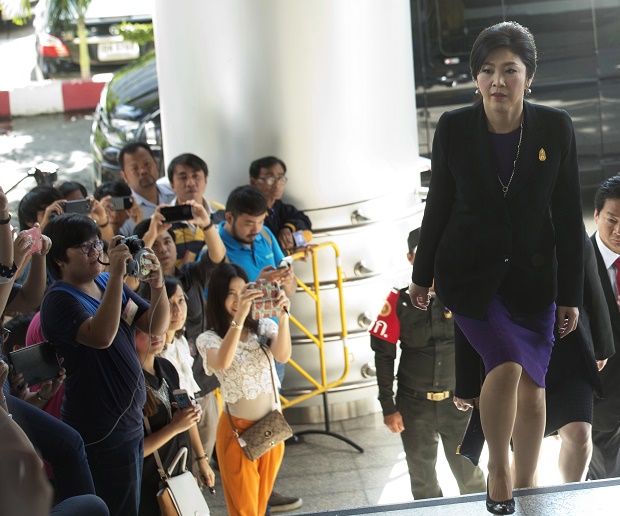Trial begins for ousted Thai Premier Yingluck Shinawatra

Thailand’s former Premier Yingluck Shinawatra arrives at Bangkok’s Criminal Court, Thailand, Tuesday, Sept. 29, 2015. AP FILE PHOTO
BANGKOK, Thailand—Ousted Thai Premier Yingluck Shinawatra went on trial Friday over a costly rice subsidy policy that could see her jailed for a decade, as the ruling junta seeks to ward off a political comeback by her family.
Yingluck, Thailand’s first female premier, was booted from office by a court days before army chief Prayut Chan-O-Cha seized power in May 2014.
READ: Thai ex-premier Yingluck impeached, faces criminal charges
She faces charges of negligence over a multi-billion-dollar rice subsidy scheme which paid farmers up to twice the market rate for their crop.
Critics say the scheme cynically tapped state coffers to prop the Shinawatra’s political base, incubated corruption and resulted in massive rice stockpiles.
READ: Thailand’s ousted PM files criminal case against opponents
But Yingluck remains popular and was greeted by dozens of supporters at court, some in red shirts, carrying roses and shouting “We Love Yingluck.”
They gathered in defiance of a ban on political meetings by a junta which has cracked down hard on Shinawatra loyalists.
Yingluck told supporters she was “confident” of being vindicated by the court.
She was not due to address the court on Friday.
Yingluck has denied any wrongdoing, saying the rice subsidy aimed to help poor farmers after decades of neglect by Bangkok’s wealthy elite.
Rice farming communities in the country’s poor but populous north and northeast are loyal to the Shinatwara family, who they laud for recognizing their changing economic and social aspirations.
Their votes have helped Shinawatra parties win every Thai election since 2001.
That electoral success stirred the Bangkok-centric royalist establishment to sponsor two coups and use their proxies in the courts to remove three Shinawatra-alligned prime ministers.
Double standards
Fearful of a political comeback, the junta has tried to tangle Yingluck in legal rulings.
She was banned by the military-appointed legislature from politics for five years and is barred from traveling overseas without permission.
Yet Yingluck is still a galvanizing force among Shinawatra supporters and remains in Thailand—unlike her older brother Thaksin, a billionaire former premier who lives in self-exile to avoid jail in the kingdom.
Analysts say the junta is walking a fine line with Yingluck’s trial.
“The junta must think carefully of not provoking supporters of Yingluck in the red camp,” Pavin Chachavalpongpun, a Thai politics expert at Kyoto University in Japan, told AFP, referring to the “Red Shirt” Shinawatra loyalists.
“The trial will serve to pin Yingluck down—not to be set free but not to be punished at the same time,” he said, predicting she will be used as a “bargaining chip” against her family.
Junta leader Prayut has vowed to end Thailand’s long history of expensive rural subsidies.
But his administration has been accused of double standards after the government this week agreed to buy 100,000 tonnes of rubber at above market prices after farmers railed at plunging prices.
Rubber farmers, mainly in the kingdom’s royalist south, played a key role in the street protests against Yingluck that led to the coup.
Yingluck’s trial is scheduled to last until late 2016, with the first prosecution witness taking the stand on Friday. She has been ordered to attend each hearing.
Thailand has lost a decade to political conflict which has claimed scores of lives and left the kingdom bitterly divided.
Experts say the crisis is in part motivated by fears among competing elites over the future of the kingdom once the reign of the revered but ailing 88-year-old monarch Bhumibol Adulyadej ends.
Prayut has clung onto power despite promising a quick return to democracy after the coup.
However the election dates keep slipping—now to mid-2017—and Prayut has employed increasingly draconian tactics to keep dissent in check.
The military has also struggled to kickstart the kingdom’s lackluster economy.














